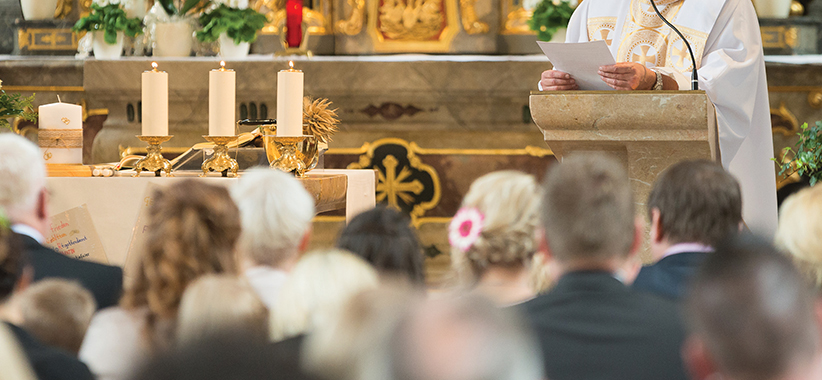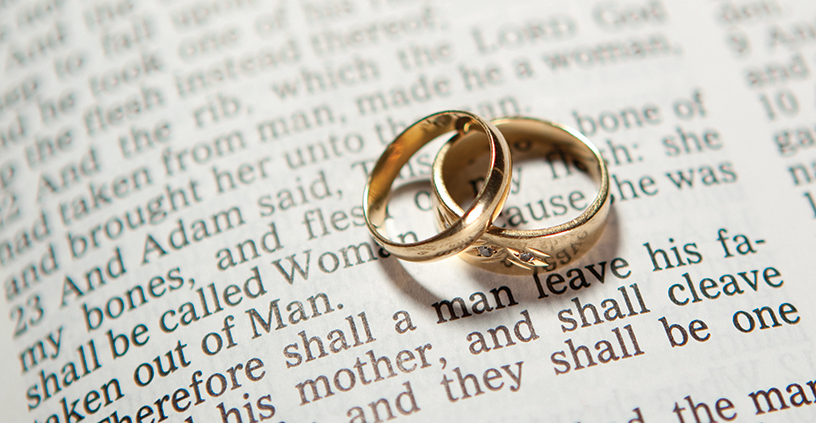Marriage and Preaching: A Match Made in Heaven
Preparing a wedding homily that transforms the lives of all present that day
Deacon Steve Kramer Comments Off on Marriage and Preaching: A Match Made in Heaven
During the past 26 years of ordained ministry, it has been my honor and privilege to preside at more than 400 weddings. Every relationship is different, and I always share with my homiletic students that it is not just another wedding (or baptism, funeral or wake service); it is this family’s wedding. Each time we witness a marriage, a new life together in Christ, it is a joy and a distinct responsibility to preach well.
Preaching is always relational. Preaching at the celebration of matrimony is not only relational but is exceptionally intimate. I have always felt blessed to be able to witness the wedding vows (consent) that a couple shares as they promise to be faithful to one another in good times and in bad, in sickness and in health, and to love each other all the days of their lives.
Remember the words that the bishop shared with you on the day of your ordination: “Receive the Gospel of Christ whose herald you now are. Believe what you read, teach what you believe, and practice what you teach.” The National Directory for the Formation, Ministry and Life of Permanent Deacons in the United States notes that “in his preaching of the Scriptures, the Creed, Catholic teachings, and the disciplines of the Church” the deacon is bound to the Holy Father and his own bishop (cf. No. 79). Our homilies must reiterate the Church’s teachings about the mystery of Christian marriage and how this marriage is rooted in the Paschal Mystery of Christ’s passion, death and resurrection.
……………………………………………………………………………………………………………………………………………..
Unique Challenges
The Homiletic Directory notes the uniqueness of preaching at a wedding: “For many Christians today, marriage is not seen as a vocation; the mystery of Christian marriage must be proclaimed and taught. The second challenge is that there are many non-Catholics and non-Christians present for the ceremony, so that the homilist cannot assume that his hearers are familiar with even the most fundamental elements of Christian faith” (No. 154).
…………………………………………………………………………………………………………………………………………….
It is important to exegete the assembly. Invariably, there will be people of various faith traditions present at a wedding Mass or celebration. Additionally, there will be inactive Catholics, “nones” (people who do not identify with any faith tradition), as well as men and women who have never been exposed to any religious traditions. Therefore, the homily becomes a tremendous opportunity for evangelization. This may be the only time, or the first time in a long while, that a person has heard the Word of God. Perhaps one spouse is Catholic and the other is not. How will our homily address Catholic belief and understanding about Christian marriage?

Assembly’s Understanding
A good starting point is to ascertain the assembly’s understanding of the Sacrament of Matrimony. This will be very helpful to those who will be listening to our homily. The new canonically approved Order of Celebrating Matrimony has been obligatory since Dec. 30, 2016. The introductory section of this document (Nos. 1-11) addresses significant points that are essential to the Catholic understanding of marriage.
The importance of the marriage covenant is discussed immediately. “The matrimonial covenant, by which a man and a woman establish a lifelong partnership between themselves, derives its force and strength from creation, but for the Christian faithful it is also raised up to a higher dignity, since it is numbered among the sacraments of the New Covenant” (No. 1). The covenant is alluded to further, noting that “a marriage is established by the conjugal covenant, that is the irrevocable consent of both spouses, by which they freely give themselves to each other and accept each other. Moreover, this singular union of a man and woman requires, and the good of the children demands, the complete fidelity of the spouses and the indissoluble unity of the bond” (No. 2).
Key Components
Covenant, sacrament, dignity, lifelong partnership, irrevocable consent, fidelity and the indissoluble bond of unity. These terms are not typically discussed or understood in our society today. However, these are key components for our wedding homily.
Once we understand that it is not what we say, rather what the congregation hears, then we can effectively preach a wedding homily. Unless we are preaching to a church filled with ministers, theological students and seminary professors, our use of church jargon has to be limited. We cannot assume that everyone will understand the concept of biblical covenant. If our language is modified so that it resonates with people, they will be able to follow our ideas and adopt them. Anytime we use a specialized term, it must be translated so people can comprehend.
Covenant
The term “covenant” has a number of implications. As a noun, it is often looked upon as a formal agreement between two parties to do or not to do something specific. In biblical terminology, a covenant was an oral agreement in which two parties bound themselves together by a specific ritual promise. It is an agreement whereby two people or parties are joined together in a union that cannot be broken. This covenant/agreement is indissoluble, no different than making these intimate promises directly with God.
In the nuptial blessing, the concept of covenant is highlighted. The Order of Celebrating Matrimony states, “O God, who, to reveal the great design you formed in your love, willed that the love of spouses for each other should foreshadow the covenant you graciously made with your people” (No. 207). Similarly, the blessing is addressed to God, stating, “O God, who consecrated the bond of Marriage to be so great a mystery that in the wedding covenant you foreshadowed the Sacrament of Christ and his Church” (No. 105).
…………………………………………………………………………………………………………………………………………….
Passages and Meanings After Loss
Every Scripture passage has a multitude of meanings and applications for the wedding. There are times that couples will choose a passage that was read at the funeral of their mother or father, such as Sirach 26:1-4, 13-26 — “Happy the husband of a good wife; the number of his days will be doubled” — or Proverbs 31:10-13, 19-20, 30-31 — “Who can find a woman of worth? Far beyond jewels is her value. Her husband trusts her judgment; he does not lack income.” Utilizing these passages can bring great comfort and peace to a family that has recently suffered the loss of a loved one.
…………………………………………………………………………………………………………………………………………….
The covenant is a key concept to focus on as we preach to the bride and groom, and their family, as they join in this sacred bond of marriage. If the marriage is to be celebrated at Mass, there are several collects and/or prayers over the offerings, which use covenantal language. If a deacon is celebrating the rite of marriage at a Eucharistic liturgy, it may be helpful to see what collects the presider plans on using. Sometimes we forget that the prayers of the Eucharistic celebration are keenly focused on the sacrament at which we are presiding.
The Roman Missal has many references to the covenant of marriage. The preface in option A states, “Lord, holy Father, almighty and eternal God. For you have forged the covenant of Marriage as a sweet yoke of harmony and an unbreakable bond of peace. …” The second collect in option B calls out to the Lord, “O God, who consecrated the bond of marriage by so great a mystery that in the wedding covenant you foreshadow the Sacrament of Christ and his Church. …” The prayer over the offerings also ties into the special bond between husband and wife: “Receive in your kindness, Lord, the offerings we bring in gladness before you, and in your fatherly love watch over those you have joined in a sacramental covenant.” Option B’s preface continues this language with, “For in him you have made a new covenant with your people, so that, as you have redeemed man and woman by the mystery of Christ’s Death and Resurrection, so in Christ you might make them partakers of divine nature and joint heirs with him of heavenly glory.” If your preaching focuses on the importance of living in a sacramental bond/union that cannot be broken, take note of the preface and collects, and ask the presider if he would be willing to use a specific prayer that will enhance the covenantal theme of the homily.

Scripture
Solid marriage preparation is the key to getting to know the couple whose wedding you will be witnessing. Allowing them to responsibly choose the Scripture passages that they feel speak to them in their love for Christ and each other is essential. I say responsibly because so many couples choose only the readings that they are familiar with. “Love is patient, love is kind” (1 Cor 12:31—13:8a), is probably the most requested Scripture passage at a wedding. However, it is not the only reading that is allowed to be proclaimed! During the course of preparation, encourage the couple to spend time with all of the scriptural options. I have found the “Together for Life” (Ave Maria, $4.95) booklet and binder system by Joseph M. Champlin to be a valuable resource in having a conversation about the readings that will be proclaimed on the most important day of this couple’s life.
Listening
Listening to a couple’s story, their faith life, joys and difficulties with their parents/siblings, and the people they work with, are invaluable as we begin to prepare the wedding homily. Building a relationship with an engaged couple is important not only for the wedding day, but as a means of encouraging and evangelizing all who are present for the sacrament. Although there are many parishes that have a “wedding ministry” whereby a parish minister or married couple does the wedding rehearsal in lieu of the presider, I have always opted to do my own rehearsals. It is amazing what is shared when we spend time together! Oftentimes, at the end of the rehearsal or rehearsal dinner, something was revealed that changes the emphasis of my wedding homily. There have been a number of times that I’ve asked if I could proclaim a different Gospel reading because something was discussed that night as we broke bread at dinner that changed my focus.
For instance, finding out that the groom and his entire family work in the construction/building business, it may be advantageous to use Matthew 7:21, 24-29, which talks about building a house on rock. Many in the congregation would be predisposed to understanding the metaphors of construction, which will be woven into a homily about building a solid relationship with each other and with Christ.
John’s Gospel has numerous passages that refer to the love that the Father has for Jesus and the love Jesus has for his disciples (cf. 15:9-12; 15:12-16; 17:20-26).
While we have only one word for love in the English language, the New Testament has several Greek words to describe love: eros, philia, agape. Eros is the physical and sensual side of love — the love between husband and wife. Philia is a deep abiding friendship just like theirs, having each other as their best friend. And, of course, agape, which is self-sacrificing love, the love that Christ has for all humankind as he is nailed to the cross for our sins. Agape love is willing to give up even life itself for another.
A couple who serves the community as police officers, firefighters or EMTs may be brought closer in their love for each other and God when they hear of the various types of love that they share in, a love of all humanity as well as for one another. This couple shares in all of these types of love. Today they publicly state that just as Christ gave his life for us, so too do they witness that their love is sacrificial and sacramental.
Preaching Is Relational
Preaching in general, and at weddings specifically, is relational. When addressing the Scriptures that are proclaimed, we must be cognizant that the hearers want to know, What does this have to do with me?, and How can this message help me to live life in an understanding of the sacrament of marriage?
The vast majority of permanent deacons have received the sacraments of marriage and holy orders, which enables him to share his lived experience of sacramental and covenantal love with the couple as they begin their new life together. The Word of God has touched us and changed our lives. Prepare the wedding homily so that it transforms the lives of all who are present that day!
DEACON STEVE KRAMER, D.Min., is the director of homiletics at Sacred Heart Seminary and School of Theology in Hales Corners, Wisconsin.
……………………………………………………………………………………………………………………………………………
A Total Self-Gift
For Your Marriage, foryourmarriage.org, offers the following background between Pope John Paul II’s theology of the body and marriage.
“Reflecting on the Genesis accounts of creation, Pope John Paul II underscored the way in which the body reflects or expresses the person. The human person discovers his dignity through his body and its capacity to express his ability to think and to choose, unlike the animals, who lack this ability (see Gn 2:19-21).
“Yet humanity is radically lacking in its expression in only one sex. The full meaning of the body and hence the human person is revealed only when the man stands over against another unique way of being human — woman. This distinctive way of being a person and a gift for others, male and female, reflects what the late pope called ‘the nuptial meaning of the body.’ Coming together in the profound partnership of marriage, man and woman live for the other in mutual love and deference. This union is expressed concretely in the couple’s bodily gift of themselves to one another in sexual intercourse. Here they speak a profound language of total self-gift and unconditional fidelity.”
…………………………………………………………………………………………………………………………………………..





